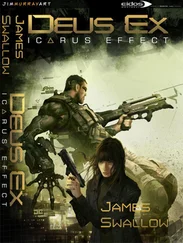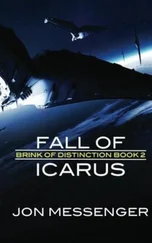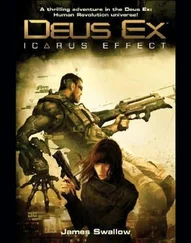Russell Andrews - Icarus
Здесь есть возможность читать онлайн «Russell Andrews - Icarus» весь текст электронной книги совершенно бесплатно (целиком полную версию без сокращений). В некоторых случаях можно слушать аудио, скачать через торрент в формате fb2 и присутствует краткое содержание. Жанр: Триллер, на английском языке. Описание произведения, (предисловие) а так же отзывы посетителей доступны на портале библиотеки ЛибКат.
- Название:Icarus
- Автор:
- Жанр:
- Год:неизвестен
- ISBN:нет данных
- Рейтинг книги:4.5 / 5. Голосов: 2
-
Избранное:Добавить в избранное
- Отзывы:
-
Ваша оценка:
- 100
- 1
- 2
- 3
- 4
- 5
Icarus: краткое содержание, описание и аннотация
Предлагаем к чтению аннотацию, описание, краткое содержание или предисловие (зависит от того, что написал сам автор книги «Icarus»). Если вы не нашли необходимую информацию о книге — напишите в комментариях, мы постараемся отыскать её.
Icarus — читать онлайн бесплатно полную книгу (весь текст) целиком
Ниже представлен текст книги, разбитый по страницам. Система сохранения места последней прочитанной страницы, позволяет с удобством читать онлайн бесплатно книгу «Icarus», без необходимости каждый раз заново искать на чём Вы остановились. Поставьте закладку, и сможете в любой момент перейти на страницу, на которой закончили чтение.
Интервал:
Закладка:
And then his fear was gone because suddenly there was no pain. Just a softness. Like some sort of pleasant dream. And no more blinding light. Instead, a gentle white cloud. He heard Caroline again. Why was she screaming? It was over now, wasn't it? There was nothing to be frightened about. There was no more pain.
He reached for her, to show her that it was all right. To show her that she was safe. But he couldn't seem to grab hold of her. She seemed to melt away from him.
Now he felt something strange. It was as if something was seeping out of him. He couldn't tell what it was. It felt good, though, that's what was so strange. He knew it was bad but it felt so very, very good.
And suddenly he knew what it was that was escaping from inside of him. What it was that was leaving, rushing away in a flood now, never to return.
It was his life itself that was deserting him.
He heard one last thing as he slid limply onto the floor. One final explosion. This one didn't frighten him at all. It was too distant. Too quiet. So he figured he had to be wrong. It wasn't an explosion. It was just a dream.
Just a nice, quiet, painless dream.
In his dream Jack reached again for Caroline. But she was gone. Jack closed his eyes.
And the dream took him into a deep, still, never-ending darkness.
TEN
Okay, everybody. It's time to put our Humpty Dumpty back together again. He's lost four liters of blood, mostly in the pelvis and hip. If we're going to keep him alive, first thing we've got to do is keep his fluids replenished. We're going to make the switch from the plasma expanders and saline tubes to the large bore. Now! This mother needs some blood and fast. He's leaking all over the fucking place."
Those were the last words spoken for the next several minutes while the large bore tubes replaced the smaller emergency tubes that had been frantically administered by the guys in the ambulance. Bigger catheters were sutured expertly into the arteries and neck. It was like a circle of serious and flawless quilters doing repair work on a worthless and torn rug. Hands moved nimbly up and down, weaving almost in unison, sealing the lifelines into place. Once the stitching was done, the catheters were hooked up to IV's and soon blood was flowing back into the unmoving body instead of just out.
The room was awash in the blood that had escaped, as were the doctors and nurses flocked around the table. The lead surgeon, Dr. Harold Solomon, shrugged his left shoulder up to wipe a splash of reddish brown from his cheek. He took a long, deep breath, exhaled through his nose as an athlete might, about to expend one last great burst of energy, and spoke quietly, quickly, and emotionlessly to the now still room. He could have been a dock foreman detailing cargo contents and shifts for union members.
"All right. We've got multiple gunshot wounds. One shot took out the right pelvis. Another the right hip. The third got the left knee. In the hip we've got a high-velocity fracture. We're gonna put in a reconstructive plate. Nothing unusual, we've all done it before. The pelvis is potentially life-threatening. We've got a communuted superior rami fracture with extension into the iliac wing. The bullet hit in the midpelvis and, besides shattering the bone, it's screwed up a lot of other things. The most crucial is that the bladder's been ruptured and that's where we've got the massive bleeding. We're going to work there first because, frankly, I don't know if he's gonna survive it, so why waste everything else. For the knee, there's a super condular fracture of the left femur. If he's still around, we'll do a similar type of reconstruction at the hip with plates and screws. All set?"
They were.
The initial surgery took eight hours and forty minutes.
The first step was to build an external fixater for the pelvis. It looked like an old-fashioned toy Erector set, a complex layering of pipes, joints, and hinges. It was a means of both elevating the pelvis – propping it up – and preventing it from splintering completely. Its essential function was to provide enough room for the bladder surgeon to go in and repair the punctured organ. If the external fixater didn't hold, the patient was dead.
The group hovering over the patient were remarkably relaxed and casual. As they worked, a stream of chatter replaced the initial quiet. There were questions about the Redskins front line and the sexual orientation of an orthopedic nurse who was not present for this surgery and there were complaints about the new vending machines in the cafeteria – there was general agreement that the hot whipped mocha concoction tasted like a combination of chalk and urine. This part of the surgical procedure was no different from the way a master carpenter put up shelves. It was done confidently, skillfully, and purely mechanically, with no thought of error. There was no science involved and zero room for interpretation. Once the decisions were made on how to proceed, this was hammer-and-nails stuff, no more emotionally involving than gluing a broken piece of china back together. The pride came from how seamlessly the pieces were restored.
When the external fixater was in place and stable, the bladder surgeon, Dr. Mugg, moved in for his turn. He was not the most popular person in the local medical community. He tended to lecture while he worked – his nickname in the halls was Dr. Smug – and several months ago he'd managed to patent a particular technique of suturing. No other surgeon in the country could now use this method without paying him a substantial royalty on each operation. As a result, Dr. Smug was not only more arrogant than ever, he was driving a new Ferrari and buying a six-bedroom weekend house on the Maryland shore. But his hands moved smoothly and surely, and however much his mouth motored, his eyes never wavered. In just over two and a half hours, Dr. Mugg turned his back on the patient and said, "It's as good as it gets. It'll take about a week to heal, then we can go back in and do an open reduction and internal fixation. He's one lucky bastard that I was in town." Without saying anything else, he left the room. The abdomen and bladder were, for the moment, whole and stable.
Now it was time for the orthopedic traumatologist, Dr. Solomon, to step back up to the table and begin to reconstruct the hip.
The bullet had completely reshaped the bone. At first, Dr. Solomon thought it might be necessary to do a replacement, but enough of the original structure around the acetabulum of the hipbone had survived so that a combination of plates and screws would suffice.
The doctor had, before entering medical school, considered becoming an architect. He was a visual person and also tended to concentrate on the way things functioned. So when he looked at an object, his mind would take him below the surface; he concentrated on structure, viewing most things as blueprints. This vaguely Platonic overview – he more often than not saw the way a thing worked rather than the thing itself – not only helped him focus when operating, it kept things on a much more objective basis. It allowed him to disassociate from the human element and concentrate on the structural work at hand. So while he went through the process of repairing this nearly destroyed hip, his eyes did not see the tissue he was slicing through nor the bone he was breaking and remaking. He saw, instead, a precise, neatly drawn architectural plan of the body.
Working from that plan in his mind, he drilled two holes into the head of the femur, inserted two screws, and attached a reconstructive plate that spanned the entire fracture. When the plate was finally in place and immovable, he looked up to see the admiring eyes of his coworkers. The blueprint faded from his mind and the reality intruded. He saw the patient, immobile on the operating table. He wondered when he'd get the details of the shooting, began to imagine the scenario that had led to this kind of destruction, then immediately shook the thoughts out of his head. It was no time to personalize. The left knee still had to be reconstructed.
Читать дальшеИнтервал:
Закладка:
Похожие книги на «Icarus»
Представляем Вашему вниманию похожие книги на «Icarus» списком для выбора. Мы отобрали схожую по названию и смыслу литературу в надежде предоставить читателям больше вариантов отыскать новые, интересные, ещё непрочитанные произведения.
Обсуждение, отзывы о книге «Icarus» и просто собственные мнения читателей. Оставьте ваши комментарии, напишите, что Вы думаете о произведении, его смысле или главных героях. Укажите что конкретно понравилось, а что нет, и почему Вы так считаете.












